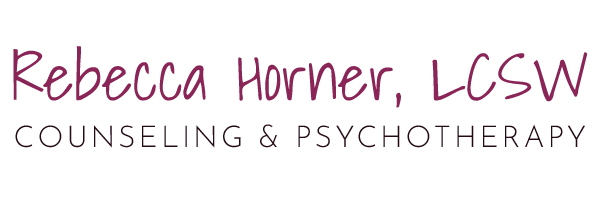Therapy for Medical Trauma
“From every wound there is a scar, and every scar tells a story. A story that says “I have survived.”
— Fr. Craig Scott
Have you undergone a serious, complicated, or life-altering medical procedure? Was your (or a loved one’s) life at stake? Do the memories of what happened keep flashing back, over and over, causing strain in your work or relationships?
If so, you may be affected by medical trauma – and I am here for you.
My name is Rebecca Horner, LCSW, and I provide therapy for medical trauma for people all over Charlotte, North Carolina. Whether you have undergone life-saving surgery, survived a deadly disease (e.g., COVID-19), or otherwise experienced a highly stressful hospital stay, I can help. If you are ready and interested in getting started, contact me today – I would love to hear from you! Read on to learn about medical trauma and how therapy can help.
What is medical trauma?
Life happens. And sometimes, life happening requires serious medical assistance.
We may need surgery for a challenging condition, expensive treatment for rare illnesses, or require multiple medical procedures due to an unexpected injury. Modern medicine is a miracle, one that saves lives and alleviates suffering.
Whether the care we need is planned or is an emergency, is invasive or relatively simple, resolves our health problem or is just the beginning of treatment, medical care has the potential to leave us with not only physical scars, but emotional and spiritual scars as well.
Trauma can happen in many ways – car accidents, combat experience, abuse, and more. Any time we experience something life threatening, disturbing, or overwhelming, the mind tends to have trouble processing it. We get hung up on the past, being painfully reminded of what happened. We lose our ability to rest and relax. We tend to withdraw and avoid things, even those who care about us.
When we experience trauma in a medical setting, therapists call it “medical trauma.” Medical trauma is a specific type of posttraumatic stress, and not all people with medical trauma may meet criteria for Posttraumatic Stress Disorder (PTSD).
Some common warning signs of medical trauma include:
Flashbacks of the event (remembering or reliving the trauma)
Guilt, shame, depression
Isolation from family and friends
Difficulty with sleep
Obsessive thoughts about the incident (such as “If only I had…”)
Resentment or anger toward medical providers
Anxiety around healthcare professionals and settings
Sadness, grief
If you or a loved one are experiencing these warning signs of medical trauma, or if you simply want extra support, don’t wait. Contact me today to get the help you deserve.
How can therapy help?
When we experience something traumatic, the mind and body are flooded with intense, powerful, painful emotions.
Just like a physical injury or trauma, we naturally try to heal and recover on our own. However, sometimes those wounds still hurt or heal improperly. The same is true with psychological trauma. While some people are able to recover naturally over time, many still struggle with the pain of what happened.
Therapy is the first line of treatment for medical trauma and other forms of posttraumatic stress because it provides a chance to readdress the injury. You and your therapist work together in a safe, confidential relationship where you can talk about what happened, feel understood and heard, and work through the emotional pain.
No matter how long it’s been, no matter how difficult it feels, therapy can help.
Can I get therapy before a potentially traumatic procedure?
If you are aware of a medical procedure that will occur in your future, I can help you strategically and psychologically plan and prepare. Ongoing psychological trauma is more likely to occur when someone is caught by surprise or is unprepared.
Prior to the medical event, we will explore your fears and concerns. Some fears and concerns have a practical solution. For instance, if you are concerned you will not receive adequate pain control during the procedure, I would assist you in calling your medical team and scheduling a one on one appointment with their anesthesiologist.
Some fears and concerns require a therapeutic solution. For instance, if you tend to feel “frozen” or “scared” in challenging situations, and worry this will be the case during the procedure, I can teach you in-depth tools and skills that will help you remain calm and engaged before, during, and after your procedure.
What does therapy look like with Rebecca?
If you are concerned that you experienced medical trauma in the past, I can help you heal and move forward.
Suffering from medical trauma can be uniquely humiliating, violating, and disempowering. In my work with survivors, I provide a collaborative, respectful, and safe space where all feelings are welcome and honored. We will work together to respectfully understand your mind and body’s experience of the event(s), and I will assess which therapeutic tools and strategies would provide you with the most relief. I will always present you with different options, and we can decide together which will be most helpful to you.
Over the past 15 years of clinical practice, I have worked in medical settings, including outpatient, inpatient, and critical care areas. I have had the rare privilege to serve as a professional psychological support person to patients before, during, and after invasive medical procedures. I worked in operating rooms and patient care areas in order to reduce the likelihood that a patient would develop symptoms of medical trauma. I have an in-depth understanding of how hospitals work and what patients and families need to know in order to ensure they have the best experience possible.
You deserve a chance at fully healing. Together, we can make that happen.
Let’s work together!
Want to learn more about my services? Interested in signing up for your first session? Contact me today to get started – I would love to hear from you.
